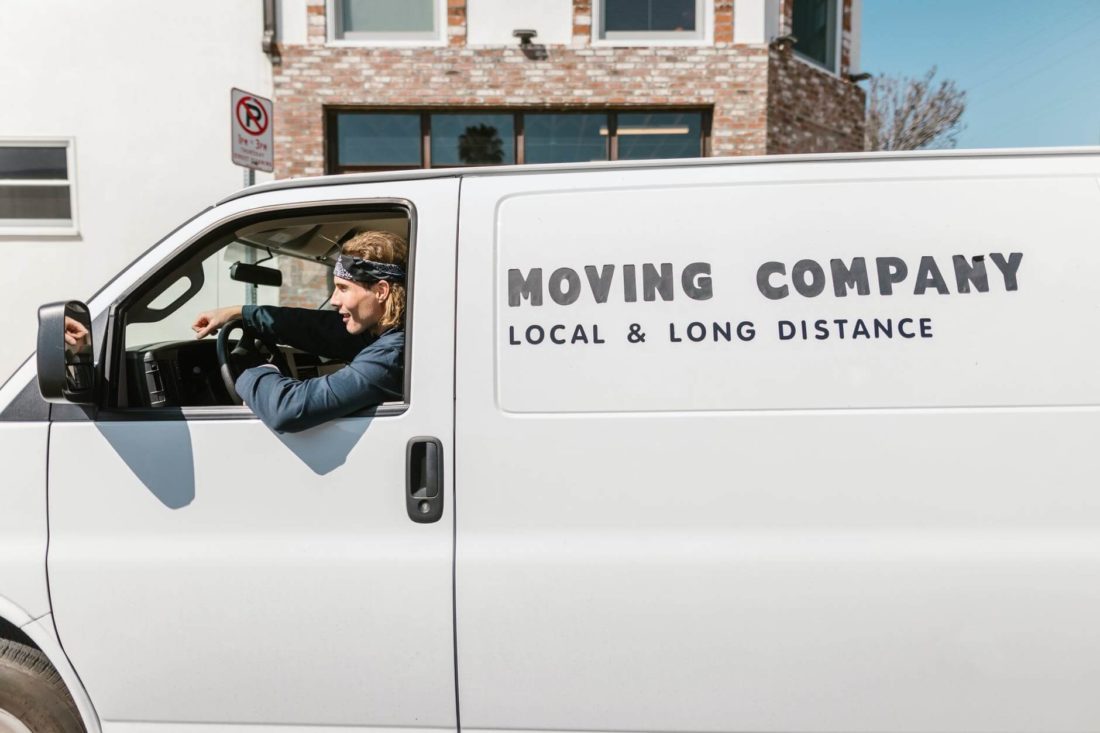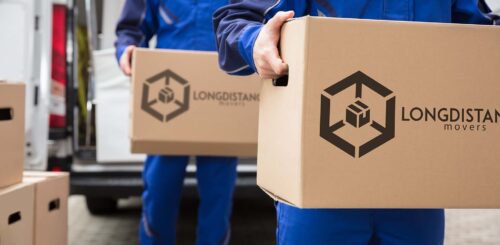Millions of Americans decide to relocate to another state for personal, working, or other reasons. That’s why finding a reputable and trustworthy cross-country moving company is of utmost importance. Especially if you want to avoid moving scams and unnecessary stressful situations.


Do you really know how moving scams work and what to do if the company scams you? Will you be able to recognize fraudulent attempts and find a trustworthy long-distance moving company? No matter your reasons for relocation, if you are relocating for a job or at the last minute, you will want to have reliable workers by your side. There are 7,000 officially registered long-distance movers working in the US, who know how many are working unregistered. This is why it is important to check if the business is legit and to pick the one that will not be deceiving and shady.
What Are Moving Company Scams? How Do You Avoid Moving Scams?
Imagine you’ve just got a quote from the relocation crew, and you accepted it. After some time, they arrive at your house, and all your belongings have been packed into the truck. The workers started to roll, they got in front of your new home, and now they refuse to unload the stuff until they get extra payment for services they never mentioned before. Since it’s against federal law for a relocation crew to withhold anyone’s items, it’s obvious – you’re being scammed.
In order to avoid any of those unpleasant surprises (which can be classified as severe relocation mistakes), make sure to research and compare relocation quotes of a few companies before you schedule the relocation. Also, keep in mind that there are many ways these fraudsters work, so be ready for detailed research on all relocation terms, and don’t forget to check whether those companies are legitimate or not.


How Online Reviews Can Help You Avoid Moving Scam
The Internet can be more than a useful source for finding needed information and reduce your anxiety about relocation to another state. Online reviews from third-party websites such as Better Business Bureau, Trust Pilot, Yelp, or Google recensions, can help you spot if the business is making some inexcusable mistakes. If their ratings are really poor, read as many reviews as you can and try to spot the pain points of their service and whether the recension is unbiased.
You might find reviews that refer to some bad practices such as surreally low quotes, unexpected costs, damaged goods, or any other problematic situation. You should avoid them and try to find another provider. Finding a hassle-free team of professionals is not an easy task. However, with the right strategy, you can easily stay away from frauds and organize your move seamlessly.


Moving Company Scams – Red Flags You Should Be Aware Of
Believe it or not, there is a pattern by which all the scammers function, and here are some essential details that should be red flags for you as a consumer. If you wonder, How do I know if a moving company is legit? The answer is – by checking if the firm has a USDOT number at the FMCSA website. According to federal law, all cross country movers must have this number, and if you can not find your team of choice, you should avoid them.
Companies That Don’t Offer in-Home Estimation Should Be Avoided
The very first contact you’ll make with chosen professionals is through the phone or their websites, which commonly provide users with free online quotes that estimate the approximate cost of relocation. According to federal law, all cross country movers must give you this initial quote online.
After this assessment, professionals should offer to give you an in-home estimation. If the mover refuses to perform an in-house estimation or tells you to pay the deposit on the day of the relocation, or you get lowballed, it’s a bad sign. All this is an unmistakable sign you should run away from the crew cause it undoubtedly has fraudulent intentions.
You can surely expect some hidden charges that were not part of the estimates. Also, some of these fraudulent companies can even promise you some impossible services, like shipping of live plants, which are forbidden by law.
Avoid Long Distance Moving With a Company That Doesn’t Seem Professional
If you already have booked the service with a cross country moving company that acted as described above, then you can also expect that there won’t be logos on a truck or even working uniforms. Moreover, they will not use any protective supplies, such as any bubble wrap and packing paper, to protect and adequately pack fragile items and other delicate belongings. Neither will they have the proper equipment such as ramps for getting the stuff into the truck, which could potentially damage your items.
Professional packers usually have very detailed packing strategies, which implies they will take care of the tiniest details. Their aim is to help you move efficiently and according to your packing schedule. They will use the best-sized boxes to pack all the stuff. They can deal with your whole household, including packing paintings or instruments, so using their services is the best way to pack for a relocation.
You Don’t Know How Much You Are Paying and For What Services
Another inconvenience will be associated with payment and extra charges. Strange charges, such as additional charging for items over 100 pounds, for example, are incredulous. So the best relocation hack we can give you is to ask all the questions you may have once the professionals are at your home. It is a huge red flag if they avoid some answers or don’t know what to tell you.
And suppose you refuse to pay any extra charges for cross country moving services that are not mentioned in a telephone conversation or in the contract. They might perform something known as items hostage and refuse to unload any of the belongings until they get paid extra. And this is something that is called padding the bill.


What to Do if A Moving Company Has Scammed You?
While 40 million Americans relocate annually, there are only four thousand complaints a year. Statistically, this is not such a big number. But, whoever is experiencing such a horrible thing would likely say that a situation in which someone has your belongings and refuses to give them back to you until you pay some outrageous amount of money is pretty unpleasant.
In case you’re experiencing any inconvenience with long-distance movers, you can file the complaint with the Federal Motor Carrier Safety Administration (FMCSA), which is a regulatory agency within the US Department of Transportation (USDOT). You can also try complaining to the firm itself, and if this doesn’t bring you any results, you should give the case to an attorney and fight for your rights against moving fraud.


How to Find Reputable Long-Distance Movers Near Me? Find Movers From Your City
Finding a reputable and trustworthy long-distance moving company within your area is not difficult if you research all the information in detail. This means consulting Google, online reviews, and experiences and references of other customers, as well as your family and friends for recommendations, especially if they moved recently.
The major benefit of finding professionals near you is that you can go to their office and speak to them face-to-face. This is one of the best possible ways to see if something is wrong and avoid relocation fraud. Some of the details you should inspect are:
- The condition of the company’s facility,
- Is there a secured parking lot,
- Are there parked trucks with firm logos, and
- What impression do you have while speaking to staff?
Check this video for more relocation tips:
How Professionals Organize the Relocation Process?
Once you’ve contacted them, professional relocation companies will ask you a few questions associated with your destination and the size of your house. Afterward, you will agree on the date of in-house estimation that will give you further insights into the total of relocation expenses you could expect. This way, you will be able to create a very accurate and detailed relocation budget.
Do Movers Charge by Weight or Volume?
Once an in-house estimation is done, professional relocation businesses will provide you with cost estimation that can be binding, unbinding, and not-to-exceed. They will also send you the contract in advance so that you can clearly understand what their service covers, what is included in the price, and what is paid extra.
The price for long-distance moving services is usually determined based on three factors:
- The volume of your household goods and home inventory,
- Mileage,
- packing services, storage, or auto-transport.
After you accept the cost scheme, the usual practice is to settle a 10% deposit in advance to secure the date of your interstate relocation. If firms ask you for a bigger deposit, they are probably scammers, so avoid them if possible. Also, if the movers give you a low bid at a price that is way below the market price, they are fraudsters too. You will probably end up with more to pay in the end.
What Other Details Contract Should Contain?
The contract should also contain a clause defining that extra costs associated with your relocation can not amount to more than 10% of the basic price. Also, how your valuable items are secured (this will be especially important for antiques, canvases, or other pieces of art.) Of course, if you add some extra items that weren’t included in the initial plan, then the firm has the right to charge you more than listed in the estimation.
Another detail to revise is what the insurance policy covers in case of damage and your rights in case of delivery delay. They will also provide you with a booklet of Your Rights and Responsibilities When You Move, which is their obligation by law.
You Should Have Insurance
Aside from the fact that every professional long-distance mover will come in uniforms with a company’s logo and all necessary equipment. In case you notice any of these elements are missing, you should seriously consider whether to entrust them with your memories, money, and other possessions. For this reason, all trustworthy businesses must provide you with basic insurance. And if you wish to have extra cover for your belongings, there should be an option for full insurance as well, where you will be fully covered if any damages happen.


How Do You Trust a Relocation Company?
Now you’ve been introduced to all the rights and responsibilities that mover has, we are sure you’re ready to make the right decision and choose the right professionals to relocate your household. Relocation is complex enough, and the last thing you want is to feel overwhelmed, ripped off, or emotionally drained. Ensure to explore everything you can about the mover, and don’t hesitate to ask for written estimates and contracts in advance, so you can evaluate all the options and make the right decision.
Another question that is a concern of many people is, do movers steal your stuff? The trustworthy crew will not tolerate these situations. They will do everything to prevent them, from choosing the employees to securing their storage facilities with 24/7 video surveillance, guards, and automated systems to record check-in and check out of your goods.


Should I Make a DIY Move?
If you’re wondering if it is better to move on your own or hire movers because these stories produce additional fear of relocation, don’t forget that there are still dedicated, responsible, and professional companies that provide impeccable service at a reasonable price. For example, Long Distance USA Movers have all the services necessary to make your relocation smooth and trouble-free.
We are also there for anyone that needs extra relocation insurance, storage units, and full auto transport. Our long-distance moving services are well-rounded and professional.
Having professional support during the relocation process will certainly make the whole experience much easier and save you from unnecessary stress if you choose the right team. So, when creating your checklist for relocating to a new state, don’t forget to put the task of finding a reliable mover high on your list cause this is the only certain way to stay far from any potential scam.
Frequently Asked Questions About Moving Scams
How Can I Avoid Moving Scams When Hiring a Moving Company?
To avoid moving scams when hiring a long-distance moving company, you should:
- Research the company and check for reviews and complaints,
- Get multiple in-home estimates,
- Ask for licensing information and insurance coverage,
- Get a written contract that details the services and costs,
- Avoid companies that ask for a large deposit before moving day,
- Don’t pack valuable items such as jewelry or important documents,
- Consider paying with a credit card for added protection.
What Are Some Common Signs of a Moving Scam?
Some common signs of a moving scam include:
- The cross-country moving company requires a large deposit before moving day,
- They have no physical address or traceable contact information,
- The long-distance movers give you an estimate over the phone without seeing the items to be moved,
- The company offers a low estimate but increases the price after pick-up,
- The long-distance moving company operates under different names,
- They have negative reviews or a history of complaints,
- The cross-country movers arrive in an unmarked truck and lack proper identification.
How Can I Protect Myself From Moving Scams?
To protect yourself from moving fraud, always research the company you are working with, make sure they are licensed and insured, read reviews, get multiple estimates in writing, pay only when services have been provided, and never accept a verbal agreement. Also, be aware of unprofessional behavior such as requests for large deposits upfront or last-minute changes to the contract. Finally, document all communication with the company and keep records of payments made.
How Can I Verify the Legitimacy of a Moving Company?
Before hiring long-distance moving services, research their reputation by reading customer reviews and checking with the Better Business Bureau. You can also ask for references from previous customers and contact them to ensure they had a positive experience.
Additionally, make sure any moving company you’re considering is registered and licensed with your state’s transportation department or public utility commission.
Lastly, ask for in-home estimates so you know exactly what cross-country moving services they offer and that they have an understanding of what needs to be moved before providing an estimate.
What Should I Do if I Suspect a Moving Company Is a Scam?
If you suspect a moving company is a scam, contact references or old reviewers to ask for proof of licensing and insurance. If the company does not provide any of this information or if the reviews don’t seem legitimate, it may be best to choose another long-distance moving service provider.
Additionally, if you feel unsafe meeting with anyone from the company in person or are suspicious about its operations, do not use their services and report them to your local consumer protection agency as soon as possible.
What Are Some Red Flags to Watch Out for When Hiring a Moving Company?
Some red flags to watch for when hiring a cross-country moving company include having an unclear or vague estimate of the total cost, not providing proof of insurance, refusing to provide references from past customers, and not offering guarantees on their work. It is also important to ensure that the company will hold any deposits until after the move has been completed satisfactorily. Compare different estimates from multiple companies before making your decision.
How Can I Get My Money Back if I Have Fallen Victim to a Moving Scam?
If you have fallen victim to moving company scams, the best way to get your money back is by filing a complaint with the Federal Motor Carrier Safety Administration (FMCSA) or contacting your local law enforcement agency. Follow up with your credit card company if you paid for services via credit card. The FMCSA has tools available to help consumers recover lost funds due to fraud.
How Can I Prevent Fraud When Paying For Moving Services?
To prevent fraud when paying long-distance movers, use a payment method that gives you additional purchase protection such as a credit card or PayPal. Additionally, ask the mover to provide proof of insurance and get all pricing in writing before making any payments. Finally, never pay a large deposit upfront – an established moving company should be able to provide services without requiring full payment upfront.
What Are Some Steps I Can Take To Ensure a Smooth and Scam-Free Move?
When moving to a new home, you can take several steps to ensure a smooth and scam-free move. Start by researching trustworthy movers in advance. Request estimates from multiple cross-country movers, read customer reviews and verify the credentials of any mover you’re considering using.
Additionally, ensure all agreements are in writing prior to signing any contracts or making payments for services. Ensure that vehicle registration information matches the company name on all rental trucks involved in your move before loading any belongings.
Finally, always use reputable payment methods such as credit cards or certified checks when affording movers with their fees. Taking these steps can help reduce the chances of becoming the victim of a moving scam when relocating your home.
How Can I Protect My Belongings During a Move to Avoid Scams?
To protect your belongings during a move, it is best to research and compare multiple moving companies, ask for quotes or estimates, hire movers with insurance coverage, take pictures of items that are being moved, and keep all documents related to the move.
Make sure the company is licensed to operate in your state and look into customer reviews. Additionally, it’s important to inspect the truck before unloading any of your items. Lastly, pay by credit card when possible so you can dispute any fraudulent charges.






